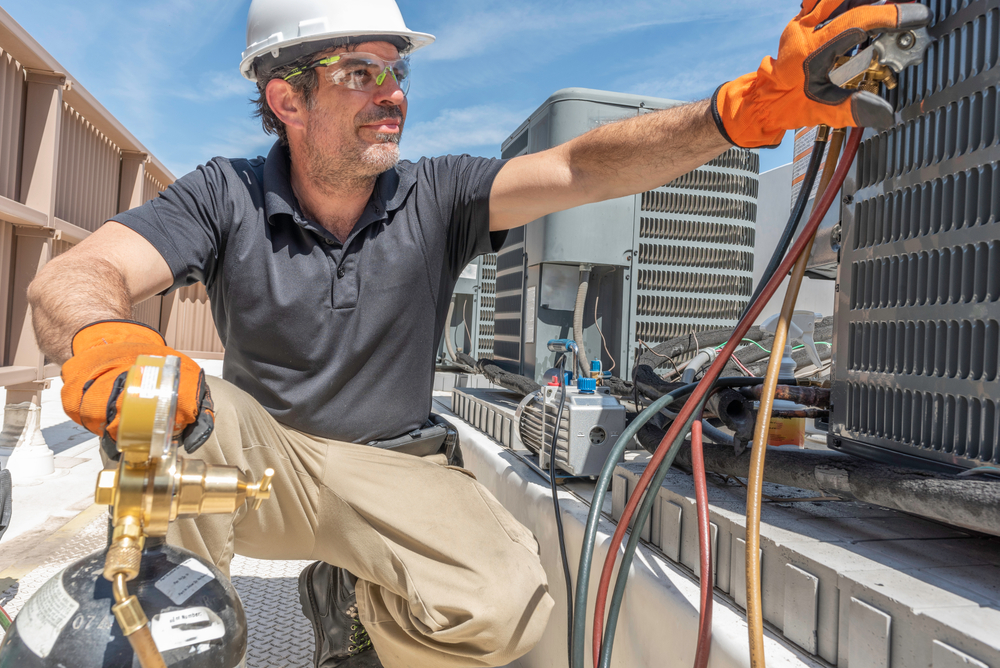If you are searching for a career path that makes a difference, offers stability, great pay, growth opportunities, and doesn’t require a college degree, look no further than the world of HVAC technicians.
HVAC stands for something that affects our daily lives in more ways than we may realize – Heating, Ventilation, and Air Conditioning. These systems are what keep our homes, offices, and public spaces comfortable and livable throughout the year.
Whether you’re a high school graduate looking for a rewarding career or someone seeking a career change, many opportunities await you in the HVAC industry. In this article, we will talk about the many benefits of an HVAC technician career in Tennessee, what skills are needed to become an HVAC technician, the different career paths you can take in the HVAC industry, and the ever-important questions of job earning potential, demand, and job security.
What is an HVAC Technician?
Have you ever experienced your air conditioning failing during the peak of summer or your heating system breaking down during the coldest months of winter? If so, you most likely relied on the expertise of an HVAC technician to resolve the issue. These professionals are essential workers who ensure that the air quality, temperature, and humidity levels in our homes, workplaces, and public spaces are optimal for our comfort and well-being.
By definition, HVAC technicians are skilled professionals who install, repair, and maintain a variety of air quality systems in residential and commercial buildings to provide year-round comfort and proper climate control. They work with various equipment, including furnaces, boilers, heat pumps, air conditioners, ductwork, ventilation systems, and sometimes refrigeration units.
Aside from troubleshooting electrical components, HVAC technicians may also inspect and clean these systems to ensure they are running efficiently and safely. The job of an HVAC technician is multifaceted, and their expertise is crucial in keeping these systems running smoothly.
HVAC technicians are not limited to working indoors; they may also work on outdoor units, rooftop systems, or even specialized equipment for commercial and industrial settings.
What Skills Do I Need to Become an HVAC Technician?
If you enjoy working with your hands, finding solutions to complex problems, and making a tangible impact on people’s lives, a career as an HVAC technician could be a perfect fit for you.
First and foremost, a solid foundation in technical skills is crucial for success as an HVAC technician. You’ll need to become proficient in areas such as electrical systems, refrigeration, heating, and air conditioning. Understanding the principles behind how these systems work and the ability to diagnose and repair issues will be a fundamental part of your role. If you don’t possess these technical skills, don’t worry. They can be learned through training and hands-on experience.
That said, being an HVAC technician isn’t just about fixing machines—it’s also about serving people. Excellent problem-solving abilities and a customer-centric approach are equally important skills to cultivate. You’ll interact with clients regularly, listening to their concerns, diagnosing problems, and providing effective solutions. The ability to communicate clearly and effectively, both verbally and in writing, will enable you to explain technical concepts to clients in a way they can understand.
Flexibility and adaptability are also highly valued skills in the HVAC industry. You’ll encounter a variety of work environments, from residential homes to commercial buildings, each with its unique set of challenges. The ability to work independently and as part of a team is crucial, as you may collaborate with other technicians, contractors, or engineers on larger projects.
Don’t be discouraged if you don’t possess all these skills. Technical skills can be learned along the way. If you have a passion for learning, enjoy working with your hands, have a knack for problem-solving, and possess a customer-centric mindset, then you already have the foundational qualities that make a successful HVAC technician.
Do I Need a College Degree to Become an HVAC Technician?
This answer may relieve many: No, a college degree is not typically required to become an HVAC technician. While a college degree can provide a solid educational foundation, the HVAC industry values practical skills and hands-on experience more than formal degrees. This means that individuals without higher education can still obtain a career in this field.
Instead of a college degree, there are alternative pathways that can lead to a career as an HVAC technician. Trade schools and vocational programs offer specialized training focused specifically on HVAC systems. Apprenticeships are another avenue to consider. We will go over these in depth in the next section.
What Training Do I Need to Become an HVAC Technician?
While a college degree is not mandatory, proper training is essential to kick-start your career. To become an HVAC technician, you’ll need to undergo specific training that equips you with the necessary knowledge and skills to excel in the field.
The following are a few of the different training options available to become an HVAC technician:
- Trade Schools and Vocational Programs: Trade schools and vocational programs offer focused and comprehensive HVAC training. These programs are designed to provide you with a solid foundation in heating, ventilation, air conditioning, and refrigeration systems. The curriculum often includes classroom instruction, hands-on practical training, and sometimes even internships or apprenticeships. Trade schools offer a more streamlined and targeted approach, allowing you to acquire the necessary skills efficiently.
- Community Colleges: Many community colleges offer HVAC programs that provide a broader educational experience. These programs typically combine classroom learning with hands-on training, offering a well-rounded education in HVAC systems. Community college programs may take longer to complete compared to trade schools, but they often provide a more in-depth understanding of the theoretical concepts and technical aspects of the field.
- Apprenticeships: Apprenticeships provide a valuable opportunity to learn on the job while working alongside experienced HVAC technicians. Through apprenticeship programs, you’ll gain practical, hands-on experience and receive guidance from seasoned professionals. This hands-on approach allows you to learn directly from experts, honing your skills and gradually building your expertise. Apprenticeships typically combine classroom instruction with on-the-job training, allowing you to develop a well-rounded skill set.
Regardless of your chosen training path, it’s essential to ensure that the program is accredited and recognized by industry organizations. This ensures you receive quality education and increases your credibility as a qualified HVAC technician.
Additionally, obtaining certifications is crucial to showcase your expertise and competence in the field. Organizations such as North American Technician Excellence (NATE) and the Environmental Protection Agency (EPA) offer certifications that validate your skills and knowledge. These certifications demonstrate your commitment to professionalism and can enhance your job prospects.
It is also important to note that the HVAC industry is constantly evolving, with technological advancements and changing environmental regulations. Continuing education and staying updated with industry trends are vital to remain competitive and expand your career opportunities. No matter how long you’ve been an HVAC technician, it would be best to consider pursuing further specialized training or attending workshops and seminars to enhance your skills and knowledge.
What Jobs Are Available for an HVAC Technician?
Most think of installations and repairs of heating and cooling systems when they think of an HVAC technician career, but there is a wide range of job opportunities in various sectors of the HVAC industry.
Here is a list of some different HVAC positions, types of HVAC careers, and job paths in the HVAC industry.
Residential HVAC Technician
These technicians focus on servicing and maintaining HVAC systems in private homes and residential complexes. They are responsible for installations, repairs, and routine maintenance to ensure optimal performance and comfort for homeowners. Strong diagnostic skills, knowledge of residential HVAC systems, and the ability to work directly with homeowners are essential for this role.
Commercial HVAC Technician
Commercial HVAC technicians work in settings such as restaurants, businesses, retail stores, and manufacturing facilities. They handle the installation, repair, and maintenance of larger-scale HVAC systems designed for commercial spaces. This role often requires expertise in complex commercial systems, including rooftop units, chillers, and boilers. Commercial HVAC technicians may also perform energy efficiency assessments and recommend system upgrades.
Green Energy Technician
The rise of solar power as a popular and environmentally-friendly energy source is making waves in the HVAC industry. It is revolutionizing how heating and cooling systems are designed and implemented, allowing HVAC technicians to embrace this expanding niche and broaden their skill set to become experts in solar-powered HVAC systems.
Refrigeration Technician
You may occasionally see the abbreviation HVACR. The R stands for refrigeration. A refrigeration technician is an HVAC technician that specializes in refrigeration. Their duties vary depending on whether they specialize in a specific type of system or technology or provide more general installation and repair assistance. But typically, they are responsible for installing, maintaining, and repairing different kinds of refrigeration systems, such as refrigerators, ice machines, beverage dispensers, or refrigerated storage units.
Equipment Manufacturer Representative
Equipment manufacturer representatives possess technical knowledge and skills related to HVAC systems. They provide feedback to manufacturers on performance issues, attend product training sessions, and offer insights to guide product improvements.
HVAC Sales Representatives
These professionals connect customers, contractors, and companies with HVAC equipment and units for purchase. They possess in-depth knowledge of HVAC products, features, and benefits, allowing them to provide guidance and recommendations to clients. Strong communication and interpersonal skills are important in this role, as HVAC sales representatives often engage in client consultations and negotiations.
HVAC Automation Service Technicians/Engineers
Automation service technicians specialize in building automation controls for HVAC systems. They design, install, and maintain sophisticated control systems that optimize energy efficiency and enhance performance. Automation service technicians often work on large-scale projects requiring a deep understanding of control systems, programming, and technical oversight.
HVAC Design/Engineering
For those interested in furthering their education and entering the engineering field, a career as an HVAC engineer may be a suitable path. HVAC engineers are mechanical engineers who design ventilation, conditioning, and heating systems for buildings. They utilize advanced modeling software, perform load calculations, and ensure industry standards and regulations compliance.
How Much Money Does A HVAC Technician Make?
With an HVAC career, you can earn a really good living. In fact, the compensation for HVAC technicians is often higher compared to many other technician roles in the United States.
According to the Bureau of Labor Statistics (BLS), the median annual wage for heating, air conditioning, and refrigeration mechanics and installers was $48,630 in 2021. In Tennessee, the median pay range is even higher. In 2022, the bureau reported the annual mean range for an HVAC technician in Tennessee to be $49,820-55,730.
While starting salaries may not be exceptionally high as an HVAC technician, as you gain experience and expertise, your compensation will likely grow over time. Also, keep in mind those numbers are only median salaries for HVAC technicians. Many people in HVAC make upwards of $150,000 a year. Additionally, HVAC technicians can potentially increase their earnings through overtime work.
The salary range in the HVAC field varies based on factors such as location, specialization, and industry demand. Also, as with any career, entry-level positions in HVAC typically have a lower salary range, while experienced and specialized technicians can earn higher wages.
For example…
- The approximate pay range for residential and commercial HVAC technicians in the United States is between $44,000-$78,000 annually.
- The national average salary for HVAC Sales Representatives in the United States is $49,586 annually.
- The average salary for Building Automation Technicians in the United States is $65,218 annually.
If you were to specialize in green energy or design and engineering, your pay range could be significantly higher.
- Newer “green positions” can earn anywhere from $60-150,000 annually.
- Those in the HVAC Design and Engineer fields can expect to make over $100,00 annually.
- Equipment Manufacturer Representatives can make upwards of $75,000-150,000 per year.
Again, where there is a higher demand, there is higher pay, and Tennessee is on the high end for demand and compensation. Moreover, if you work for a larger company, you may have opportunities to supplement your income by providing private HVAC consulting and technician services during your free time.
Are HVAC Technicians in High Demand?
Yes, HVAC technicians are in high demand, especially in Tennessee. According to the U.S. Bureau of Labor Statistics, Tennessee is one of the states with the highest employment levels and concentration of jobs and location quotients in Heating, Air Conditioning, and Refrigeration Mechanics and Installers.
No matter the location, HVAC technicians are in high demand for several reasons. The most obvious is that HVAC systems are essential for maintaining comfort, air quality, and safety in various settings. Whether providing heating, ventilation, or cooling, HVAC systems are vital in ensuring optimal conditions within residential, commercial, and industrial spaces. HVAC technicians are responsible for installing, repairing, and maintaining these systems to ensure they operate effectively and efficiently.
Another driving factor for the high demand is the need to replace aging HVAC systems. As older systems become outdated or inefficient, there is a growing demand for technicians who can upgrade to newer, more energy-efficient models. HVAC technicians with the expertise to install and maintain these advanced systems are highly sought after by both residential and commercial clients.
Beyond that, the industry is experiencing significant growth and expansion. With population growth and increased construction activities, the demand for HVAC technicians continues to rise. New residential, commercial, and industrial buildings require HVAC systems to be installed and maintained, creating a constant need for skilled technicians.
And let’s not forget the emphasis on energy efficiency and environmentally friendly practices. The green movement further fuels the demand for HVAC technicians. With increasing concerns about climate change and energy consumption, there is a strong focus on designing and implementing energy-efficient HVAC systems. Technicians knowledgeable about sustainable technologies and practices are in high demand to help meet these environmental goals.
The evolving nature of the HVAC industry, with new technologies and innovations, also contributes to the demand for skilled technicians. As HVAC systems become more advanced, technicians with specialized knowledge are needed to handle the complexity of these systems. From smart controls to renewable energy integration, HVAC technicians who can work with these advanced technologies are highly valued.
Do HVAC Technicians Have Job Security?
Job security is important to consider when deciding on a career path. While job security can vary based on individual circumstances and economic factors, the HVAC industry provides a solid foundation of stability and growth potential.
There are several reasons why HVAC technicians enjoy job security in their chosen field. For starters, HVAC systems are essential to homes, commercial buildings, and industrial facilities. These systems require regular maintenance, repairs, and installations regardless of economic conditions.
Moreover, the HVAC industry is considered essential, meaning it plays a crucial role in maintaining the comfort, health, and safety of individuals in various settings. This designation ensures that HVAC technicians are often in high demand, even during challenging economic times or unforeseen circumstances.
Another factor that adds to job security in the HVAC field is the constant technological advancement. The industry is continually evolving, driven by advances in energy efficiency and sustainability practices. This evolution creates opportunities for technicians to specialize in new systems, renewable energy technologies, smart HVAC controls, and other emerging areas.
HVAC technicians also benefit from diverse job opportunities. They can work in various sectors, such as residential, commercial, or industrial settings. They may find employment with HVAC manufacturers or service companies, and some might even choose to work as independent contractors.
Benefits of an HVAC Technician Career
Beyond excellent compensation, high job demand, long-term job security, and no need for an expensive college degree, an HVAC technician career has many other benefits.
Work from anywhere: The demand for HVAC services exists worldwide, providing flexibility in choosing where to live and work. Moreover, as technology advances, remote diagnostic and troubleshooting tools are becoming more prevalent in the HVAC industry. This enables some technicians to assess and address HVAC system issues remotely, reducing the need for physical presence at job sites. With the ability to work from anywhere, HVAC technicians can enjoy the benefits of a versatile career that offers mobility, flexibility, and the potential to explore different regions or even work in remote areas where HVAC services are in demand.
Variety:
HVAC technicians often find themselves in different locations, working on a diverse range of projects each day. From residential homes to commercial buildings, every job presents unique challenges and opportunities for learning. Unlike jobs that involve repetitive tasks, HVAC technicians enjoy a dynamic work environment. They encounter new systems, configurations, and equipment, requiring them to adapt their skills and problem-solving abilities. HVAC technicians also interact with different clients and work alongside diverse teams. This variety keeps the work interesting and engaging, preventing monotony and fostering continuous learning and growth.
Workplace independence:
HVAC technicians have the flexibility to take charge of their daily schedule without constant supervision. Whether working on repairs, installations, or maintenance tasks, HVAC technicians typically have a lot of flexibility to make decisions and plan their workload accordingly. Additionally, some HVAC professionals can work as independent contractors or start their own businesses, further enhancing their independence and potential for financial growth.
Take-home work vehicle:
One enticing benefit of certain HVAC technician jobs is providing a take-home work vehicle. While not all HVAC positions offer this perk, it is common in many roles, especially those that involve service and repair work. Having a company-provided vehicle allows you to travel directly from home to job sites, saving you commuting time and hefty expenses like gas and insurance. If you operate as an independent HVAC technician and utilize your own vehicle for work purposes, you may be eligible for a tax write-off. This means that a portion of your vehicle expenses, such as fuel, maintenance, and insurance, can be deducted from your taxable income, potentially reducing your overall tax liability.
Helps you stay active:
Unlike sedentary office jobs, HVAC technicians are constantly on the go. Whether troubleshooting systems, installing new units or conducting routine maintenance, you’ll be engaged in tasks requiring movement and physical effort. By being on the move, you enhance your cardiovascular health, strengthen your muscles, and promote overall well-being.
Mental stimulation:
Besides the physical benefits, the active nature of HVAC technicians is excellent for your mental health. Each day brings new challenges and tasks, keeping you mentally engaged and preventing monotony.
Make a positive impact on the environment:
By working with heating, ventilation, and air conditioning systems, technicians can contribute to energy efficiency and sustainability efforts. They play a crucial role in promoting and implementing energy-efficient practices, reducing energy consumption, and minimizing carbon emissions. HVAC technicians also contribute to environmental conservation by adopting and promoting the use of eco-friendly refrigerants and equipment, empowering individuals and businesses to make environmentally conscious choices.
Improve people’s quality of life:
Sweating through a hot summer day without air conditioning or freezing on a cold winter night without heat is not only unbearable, but it can also be dangerous. As an HVAC technician, your work directly improves the lives of individuals and businesses. By fixing and restoring HVAC systems, you provide the comfort and convenience people rely on. Every day as an HVAC technician, you have the opportunity to directly improve lives in a tangible way. The smiles on your customers’ faces, the gratitude they express, and the positive impact you have on their daily lives are priceless.
Development of problem-solving skills:
With the diverse range of air conditioning systems and unique challenges in this field, HVAC technicians are constantly engaged in creative problem-solving. Each day brings new situations where you’ll need to analyze, diagnose, and find solutions to issues related to HVAC systems. From troubleshooting malfunctions to designing efficient ductwork layouts, you’ll be tasked with finding practical and effective resolutions. This constant problem-solving fosters the growth of your analytical thinking, attention to detail, and ability to think on your feet.
Room for growth and professional advancement:
In this dynamic field, numerous opportunities exist to expand your skills, knowledge, and responsibilities, paving the way for a rewarding and fulfilling career journey. As you gain experience and expertise, you can progress from entry-level positions to more specialized roles such as lead technician or supervisor. Acquiring specialized certifications and staying updated with industry trends also opens doors to higher-level positions.
How Workforce Essentials Can Help You Become an HVAC Technician
With the right skills and knowledge, individuals pursuing a career as HVAC technicians can enjoy a promising and secure future in this thriving field. At Workforce Essentials, we can help get you there.
We provide comprehensive employment and training services tailored to individuals from various backgrounds and are here to assist you in finding your next job opportunity. We can help you write your resumé and sharpen your interview skills, provide job application assistance, skills assessment and career planning, short-term training and tuition assistance, financial support, help connect you with local employers, and more.
Be it as an HVAC technician or another career path, we are committed to helping you find meaningful employment and achieve your career goals. Contact us today to get started on your job search journey in Tennessee.




